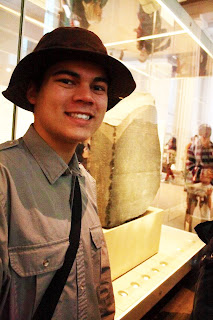I was reading recently that the famous line from the
Declaration of Independence that calls “life, liberty, and the pursuit of
happiness” inalienable rights is a paraphrasing of an idea that was expressed
somewhat earlier that year by the writer of Virginia’s Declaration of Rights,
George Mason. See if you can find the
similarity.
“That
all men are by nature equally free and independent, and have certain
inalienable rights, of which, when they enter into a state of society, they
cannot, by any compact, deprive or divest their posterity; namely, the
enjoyment of life and liberty, with the means of acquiring and possessing
property, and pursuing and obtaining happiness and safety.”
That
is Section One and clearly inspired Thomas Jefferson to start the US’s own
Declaration with a somewhat more concise statement. Mason hit upon a very important point in
writing this bit, that the possibility of private ownership is part of the
package of rights endowed to humans by the “Law of Nature and of Nature’s God”
(to borrow from Jefferson).
The
idea of property is something that people often take for granted because it
just seems so natural. Yet a large issue
arises when a government or some other authoritative entity encroaches on the
property of others. Often times, some
will take the ideological stance that private property should be abolished and
everything be shared equally. Thankfully
this is an antiquated view. But a more
common view, even today, is that the resources of those who possess more than
the average citizen should be taken and redistributed to those who have
less. This broad concept is used, in
part, for the justification of progressive taxes, entitlement programs, and the
like. But I digress.
The
ability to have and securely hold property is not only a human right necessary
for the individual, but also for the smooth functioning of society as a
whole. Imagine what the world would be
like if there was no property or only limited ownership! At the personal level,
the need for ownership is easy to see. After
all, knowing that you have a bed, toothbrush, and cereal that will not be appropriated
by others at their discretion is an important part of a smoothly operating
life. But at the level of society as a
whole, things become more abstract. Bur
private ownership is crucial here too. For
example, patents, trademarks, and copyrights exist so that the creator of a
medicine, the engineer of a car, the author of a book, or the scientist of some
new groundbreaking material can reap the reward of his labor. Without that, there would be no incentive to
create. Even for people who are
motivated purely for the betterment of humanity must at the very least draw in
the resources to pay for outlays made in the development process.
In a
different vein, think of the owners of businesses. If they cannot operate in a legal environment
which protects them from theft, then they will have very little incentive to do
business in the first place. One would
rightly wish to reap the benefits and profits of his business if he must incur
the costs and risks associated with it as well. The benefit for society is the fruits of his
labor. Boeing makes airplanes, AstraZeneca
makes medicine, and Archer Daniels Midland makes food. Taken as a whole, the product of everyone’s
labor is for the benefit of all a country’s inhabitants. This well-functioning economy is made possible
by many things, not the least of which being private ownership of the means of
production, both physical and abstract. Without
property, a nation would function no less if it deprived its citizens of their
liberty and even their lives.


